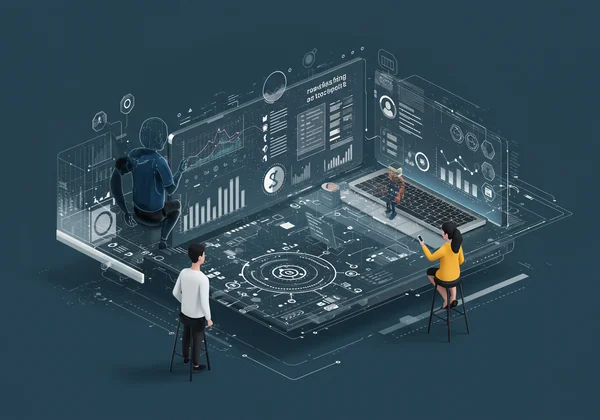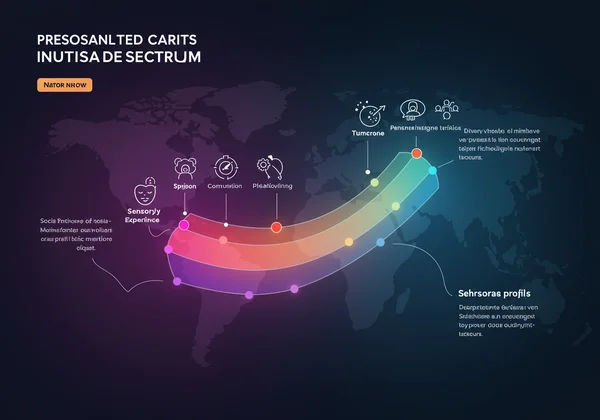AI Autism Report: Maximize Your Personalized Autism Spectrum Test Insights
September 15, 2025 | By Leo Whitaker
Have you completed an online autism spectrum test and received a preliminary summary? That initial result is an important first step, but it's only the beginning of the story. Our unique, AI-powered report lets you go much deeper, transforming a simple score into personalized insights, identified strengths, specific challenges, and actionable recommendations. But what to do after a positive autism screening test? This guide, from a tech perspective, will show you how our advanced AI autism report works and how you can truly maximize its value for personal growth and informed next steps.
The journey of self-understanding is deeply personal, and having the right tools can make all the difference. While a standard online quiz provides a snapshot, our AI engine creates a detailed map. It analyzes the nuances in your responses to provide a comprehensive profile that a simple scoring system can't match. If you're ready to move beyond the summary and unlock a richer understanding, take the free test and see what personalized analysis can reveal.

Understanding Your Personalized Autism Insights
A traditional screening tool often concludes with a numerical score, which can leave you with more questions than answers. Is the score high or low? What does it actually mean for daily life? This is where our AI-driven analysis offers a major step forward in understanding, offering you truly personalized autism insights that are both meaningful and practical.
What Does Your AI Autism Report Truly Reveal?
Unlike a static questionnaire, our system uses sophisticated algorithms to look for patterns and connections within your answers. It doesn't just count the number of "yes" or "no" responses. Instead, it assesses the interplay between different traits related to social communication, sensory experiences, and behavioral patterns. This allows the report to move beyond a generic label and highlight a unique profile of autistic traits.
Your personalized report provides a detailed view that includes:
- A Spectrum-Based Analysis: Instead of a binary "autistic or not" result, the AI places your traits along a spectrum, acknowledging the vast diversity within the autistic experience.
- Trait-Specific Breakdowns: The report details how your responses align with core areas of the autism spectrum, such as social reciprocity, sensory sensitivity, and adherence to routines.
- Confidence Indicators: The AI provides context on how strongly your response patterns correlate with recognized characteristics of Autism Spectrum Disorder (ASD), giving you a clearer picture of the findings.
This level of detail is designed to give you a vocabulary and a framework for understanding your own experiences. It's a data-driven starting point for deeper self-reflection.

Decoding Your Unique Strengths and Neurodiversity
One of the most powerful aspects of our AI report is its focus on a balanced perspective, a key part of celebrating neurodiversity. The technology is programmed to identify patterns that correlate not only with challenges but also with significant strengths. Many traits associated with autism, such as intense focus, loyalty, attention to detail, and pattern recognition, are valuable assets.
Your report will help you decode these strengths, which might include:
- Systematic Thinking: An ability to see the logic in complex systems, whether in technology, music, or nature.
- Deep Focus: The capacity for intense concentration on subjects of interest, leading to a high level of expertise.
- Honesty and Directness: A communication style that prioritizes clarity and truthfulness.
By highlighting these positive attributes, the AI report helps reframe the narrative from one of deficit to one of difference. It empowers you to see your unique way of thinking as a complete picture of strengths and challenges, which is essential for building self-esteem and leveraging your natural talents. You can get your insights to see this balanced perspective for yourself.
Transforming Insights into an Autism Action Plan
Information is only useful when you can act on it. The ultimate goal of our AI report is to bridge the gap between understanding and action. It translates your personalized insights into a practical autism action plan, offering concrete suggestions tailored to your specific profile.
Practical Strategies for Daily Living & Self-Regulation
Based on the challenges identified in your report, the AI generates a list of practical, well-researched strategies. These aren't generic tips; they are targeted recommendations based on your unique sensory and cognitive profile. The goal is to equip you with tools for effective self-regulation and improved well-being.
For example, if your report indicates high sensory sensitivity to noise, your action plan might suggest:
- Using noise-canceling headphones in loud environments.
- Designating a "quiet zone" at home or work.
- Communicating your sensory needs to family and colleagues.
If it highlights challenges with executive functioning, such as planning and organization, it might recommend:
- Using visual calendars or task-management apps.
- Breaking down large projects into smaller, manageable steps.
- Setting daily routines to create structure and predictability.
These actionable recommendations empower you to make small but impactful changes in your daily life, fostering a greater sense of control and reducing potential stressors.

Navigating Challenges: Targeted Approaches for Common Difficulties
The report also provides targeted approaches for navigating more complex social or emotional challenges. By understanding the root of these difficulties, you can develop helpful coping strategies. The AI helps connect the dots between your autistic traits and your real-world experiences.
For instance, if your profile suggests difficulties interpreting non-verbal social cues, the action plan won't simply state the problem. It will offer proactive approaches, such as seeking out resources on social cognition or practicing conversations in low-stakes environments. It shifts the focus from "what's wrong" to "what can I do about it," promoting a mindset of growth and adaptation. By starting your screening, you can receive guidance on turning these challenges into opportunities for learning.
Effectively Using Autism Test Results for Next Steps
Receiving your comprehensive AI report is an important milestone, but it's also a stepping stone. Using autism test results effectively means seeing them as a tool to guide your next steps, whether that involves seeking a formal diagnosis, communicating with loved ones, or simply continuing your journey of self-discovery.
Communicating Your Report with Professionals & Support Networks
It is critical to remember that this AI report, while detailed and scientifically grounded, is a screening tool—not a formal medical diagnosis. Its primary purpose is to provide you with structured information. This makes it an incredibly valuable document to share with healthcare professionals and your support networks.
When you consult with a doctor, psychologist, or therapist, you can present the report as a summary of your self-observations. It provides a clear, organized starting point for a diagnostic conversation, saving time and ensuring your key traits are discussed. It gives you and your healthcare provider a common language to discuss your experiences, which is a vital part of the diagnostic process.

Embracing Continuous Self-Discovery & Growth
Your AI report is not the final word on who you are; it is a starting point for ongoing self-discovery. Use its insights as a lens through which to view your past experiences and a guide for your future. It can help you understand why you've always felt a certain way or excelled in specific areas.
Embrace this newfound knowledge to connect with the neurodivergent community, explore resources, and advocate for your needs. Understanding how your brain works is an empowering step that can lead to greater self-acceptance and a more authentic life. This journey of personal growth is ongoing, and your report can be a guide to help you navigate it.
Empower Your Journey: Beyond the Initial Screening
An initial screening offers a glimpse; an AI-powered personalized analysis provides a deep, actionable understanding. This AI autism report is designed to do more than just present data—it's built to empower you. It translates your unique traits into a clear profile of strengths, challenges, and an action plan, giving you the tools to take confident, informed next steps on your journey.
Don't settle for a simple score. Your experiences are more complex than that. Unlock your report today to gain the personalized insights you deserve and start building a future that feels right for you.
Frequently Asked Questions About Your Autism Report & Next Steps
Is an online autism test accurate?
Online autism tests, like the ones offered on our platform, should be viewed as reliable screening tools, not diagnostic instruments. They are based on scientifically validated questionnaires (like the AQ) and are highly accurate at identifying autistic traits that may warrant further investigation. However, a formal diagnosis can only be provided by a qualified healthcare professional after a comprehensive clinical assessment.
What to do after a positive autism screening test?
A positive screening result indicates that you have a significant number of traits associated with autism. The best next step is to use this information as a catalyst for deeper exploration. We recommend unlocking the detailed AI report to gain personalized insights and an action plan. You can then use this comprehensive report as a starting point for a conversation with a doctor or mental health professional to discuss the possibility of a formal assessment.
How to get a formal autism diagnosis?
The path to a formal autism diagnosis typically begins with consulting your primary care physician. They can refer you to a specialist, such as a psychologist, psychiatrist, or neurologist, who has experience in diagnosing autism in adults, teens, or children. The formal assessment process is thorough and may include interviews, behavioral observations, and additional standardized tests. Your online autism screening results can be a helpful document to bring to your first appointment.
Can you be mildly autistic?
Yes. Autism is a spectrum, which means it affects every individual differently. Some people may have traits that meet the criteria for an autism diagnosis but require minimal day-to-day support. This is sometimes referred to as "mild" autism or, in clinical terms, requiring "Level 1" support. The experience of autism varies widely, and our AI report is designed to reflect that individuality rather than applying a one-size-fits-all label.